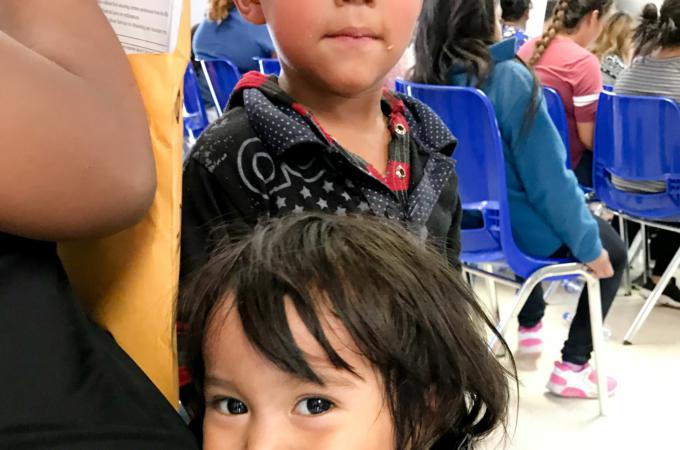The gospel work at the border
[Deacon Timothy Donohue of Holy Family Parish, West Roxbury made a trip to the U.S.-Mexico border city of Brownsville, Texas June 24-26 to see first-hand and raise awareness of the experience of immigrants and asylum seekers at the border. The following is among his observations of the situation there. -- Editor]
The Respite Center in Mcallen, Texas started in 2014 with a conversation. The parishioners from Sacred Heart Parish in Mcallen noticed that some of people at the bus station looked frightened and their clothes were ripped and dirty. Some had small children and babies that were crying. There were no clean diapers. The faces changed everyday but they all shared the same demeanor. So the parishioners themselves began listening to their stories.
The travelers had left Guatemala, El Salvador and Honduras over six weeks ago with the hope of building a new life in the United States. Most had crossed the border and waited for the Border Patrol to find them and pick them up. A smaller number had entered the Port of Entry in Mcallen. All were requesting asylum.
The "Good Samaritans" began bringing food, diapers, toiletries and snacks to these strangers in the trunks of their cars and gave them food and snacks for their next journey on a bus, to be with their relatives. The "Samaritans" parked near the bus station until the numbers became so great they were told to leave by the bus officials. The "welcoming committee" went to the nearby parish priest and asked for help. Sacred Heart Parish Hall then became a respite center organized by Sister Norma and not too long after that they moved into their own building near the bus station.
Sister Norma Pimentel, Missionaries of Jesus, is the leader of a large team of volunteers on duty every day to greet and tend to an average of 250 asylum seekers daily. Sister is the CEO of Catholic Charities -- Rio Grande Valley in the Diocese of Brownsville. The team is ready pick up men, women and children at the bus station whenever they were dropped off by Border Patrol.
Today this has changed a bit. Now asylum seekers are advised they must enter through the Port of Entry to seek asylum. There are many reasons why this is not easy. If they cross the river and do not come through the Port of Entry they are arrested and go to jail. This is what has changed.
The reasons they come are the same. The stories about their living conditions, the daily fear that they lived with, that moved them to make the very dangerous and difficult journey are heartbreaking. "The gang was forcing my son to join the gang." "My sister was raped. My uncle was murdered." "My cousin was kidnapped for ransom."
Most, if not all, of the travelers have a relative already here in the U.S. After they come through the Port of Entry and they are screened for prior offenses, each person has an opportunity before a judge to present their plea for asylum. If a court date is given, it is usually a future date six months to a year away and in the jurisdiction to which they are traveling. Now, after their hearing many are fitted with an electronic ankle bracelet that they wear until their next appearance in court.
The asylum seekers have already spent $8,000 to $10,000 to pay bribes along their way, completed the trek of 1,000 miles across Mexico, survived the gangs along the way and drug trafficking cartels around the Rio Grande area. The process includes passing through the Port of Entry run by Customs and Border Protection or being arrested by Border Patrol, held for interrogation and hopefully getting a chance to present their case for asylum before a judge.
After court, and after getting a notice to appear in court, so that a judge can hear their case, the travelers are processed and released at the local bus station.
The Respite Center is an oasis of grace, compassion and love. The travelers are picked up at the bus stations by the "pick up team" and arrive with all of their belongings in their arms to cheers and applause. They sit in rows and Sister Norma welcomes them and invites the children to the kitchen for homemade soup while she talks to the adults about their short stay at the center. There are diapers, clothes, snacks, and toiletries for everyone. There is one shower - first come first serve. They come in waves, 20 to 50 at a time, 250 a day. But no day is the same.
Each person will talk to a counselor who will make a phone call to their "destination" person to check on bus schedules and other arrangements. Everyone gets a paper that says "I can't speak English - can you help me please." The children can play with games or Legos or dolls. There are volunteer nurses and doctors who screen for illness or injury. The center is full of volunteers who smile and help with feeding a baby, reading a story, holding a child in distress. The compassion and love of the volunteers stands out in the midst of this whirlwind of a visit to a small place sandwiched in the middle of the journey of a lifetime. All this started with a conversation inspired by the Good News of the Gospel and our love for each other.



















